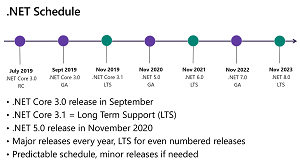News
First .NET 7 Release Candidate Ships
After seven previews dating back to February, Microsoft shipped .NET 7 Release Candidate 1, the first of two before the framework reaches General Availability in early November.
At this point, with RC1 supported in production, the framework is basically all set for new and exciting features as the dev team fixes and polishes things for a debut during .NET Conf 2022, which starts Nov. 8.
Thus Microsoft's Sept. 14 announcement post mostly recaps things related to .NET MAUI, cloud native best practices, ARM64 support, modernization and performance.
Regarding that latter item, Microsoft earlier posted a huge tome about "Everything Anyone Could Possibly Want to Know About .NET 7 Performance Improvements."
That six- or seven-hour read was summed up in today's RC1 announcement: ".NET is fast. .NET 7 is the fastest .NET yet. Over a thousand performance-impacting improvements went into .NET 7 impacting reflection, On Stack Replacement(OSR), start-up time, Native AOT, loop optimizations and many other areas."
As far as .NET MAUI, which Microsoft describes as the evolution of the mobile-centric Xamarin.Forms framework in that it adds the capability to create desktop apps in addition to Android and iOS apps, the company today lauded its ability to help developers create a single project that handles multi-targeting across devices and their platforms.
".NET Multi-platform App UI (MAUI) unifies Android, iOS, macOS, and Windows APIs into a single API so you can write one app that runs natively on many platforms," Microsoft said. ".NET MAUI enables you to deliver the best app experiences designed specifically by each platform (Android, iOS, macOS, Windows, and Tizen) while enabling you to craft consistent brand experience through rich styling and graphics. Out of the box, each platform looks and behaves the way it should without any additional widgets or styling required." You can read more about that in the Visual Studio Magazine article from last month titled "Visual Studio 2022 17.3, .NET MAUI Now Generally Available."
ARM64 support, meanwhile, provides a small form factor with exceptional performance and high-power efficiency, the company said. You can learn more about that in the article titled "Visual Studio 2022 17.4 Preview 1 Furthers Arm64 Support."
Microsoft said .NET 7 RC1 has been tested with Visual Studio 17.4 Preview 2, recommending that developers use the preview channel builds to try .NET 7 with Visual Studio on Windows and the latest Visual Studio 2022 for Mac preview for those on macOS machines.
 [Click on image for larger view.] The .NET Schedule (source: Microsoft).
[Click on image for larger view.] The .NET Schedule (source: Microsoft).
The company noted that .NET 7 is not a Long-Term Support (LTS) release, so it will receive free support and patches for 18 months from the release date rather than the much-longer (three years after the initial release) LTS support period, though it emphasized that the quality of both kinds of releases is the same, with the only difference being the length of support.
About the Author
David Ramel is an editor and writer at Converge 360.